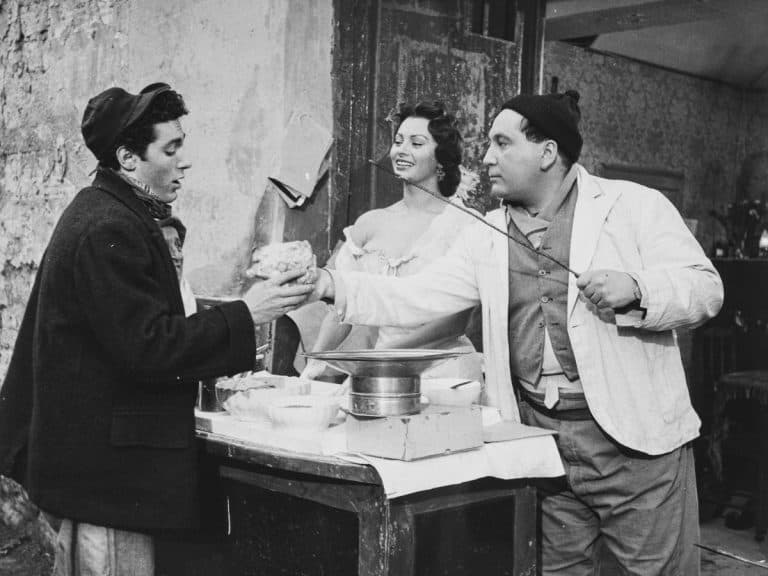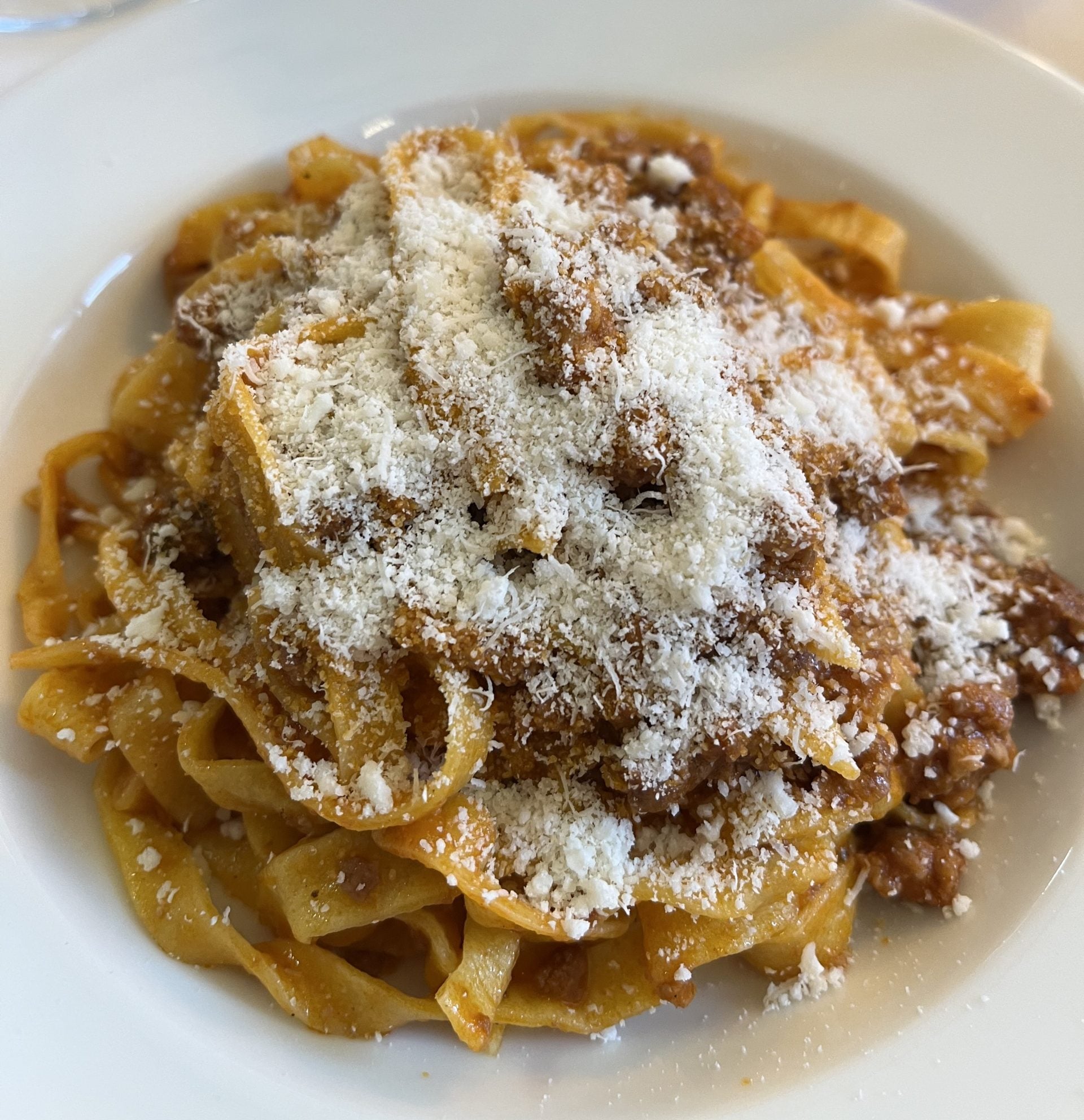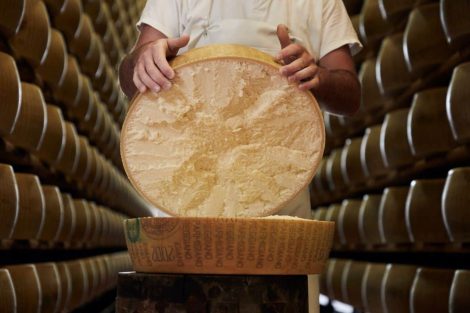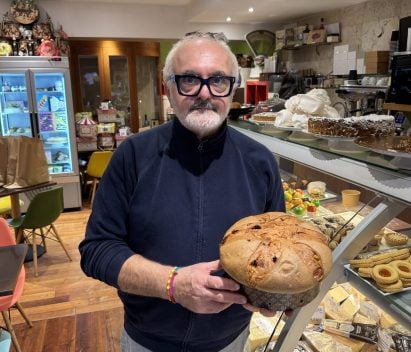To mark 50 years since the death of Vittorio De Sica, the 81st Venice International Film Festival has chosen the masterpiece L'Oro di Napoli for the pre-opening in the "Venice Classics" section, where it will be screened before the official start of the festival. The film comprises six episodes, each offering a small but vivid portrait of Naples and its people. An homage to the city and its character, this 1954 anthology film is based on the collection of short stories by Giuseppe Marotta, adapted for the screen by De Sica’s longtime collaborator Cesare Zavattini. The film features many food-related moments, often tinged with bittersweet undertones.
The pre-opening Film of the Venice Film Festival
In the episode that opens the film, Don Saverio Petrillo, played by Totò, is a "pazzariello" (a traditional street entertainer) whose life has been a living hell for the past ten years. He is bullied by a local thug, Don Carmine Savarone, who has moved into Saverio’s house and taken control of his family after the death of his wife. Following a suspected heart attack, the thug is advised to avoid stress and excitement for the sake of his heart. Saverio seizes the opportunity to evict him in front of the entire neighborhood, believing that Don Carmine can no longer harm him. However, the diagnosis was wrong, and once Don Carmine realizes this, he returns to the Petrillo home seeking revenge. But seeing the united, though terrified, family determined not to give in, he leaves without carrying out his threats. Not before ruining their much-anticipated Christmas Eve dinner of eel and desserts, though. With disdain, the thug "defiles" the dishes on the table, effectively shattering the magic of the holiday.
Credit Pizza
Much has been written about this iconic episode featuring Sophia Loren. Sophia and her husband Rosario run a "pizza a otto" stand in the Materdei district, where they fry pizzas on the street, to be paid for after eight days. The pizzas are good, but Sophia’s beauty also draws in customers. One day, Rosario notices that Sophia no longer has a precious ring on her finger. She claims to have lost it while making pizzas, but she knows full well that she left it at her lover’s house. The couple searches the city, tracking down the receipts for the "suspended" pizzas, visiting everyone from the night watchman (voiced by De Sica) to a friar, and even attending a wake, where they ask the widower (masterfully portrayed by Paolo Stoppa, who won the Nastro d'Argento for Best Actor) if he might have found a ring in his pizza. The ring is eventually returned by Sophia’s lover, who claims to have found it in a pizza. Rosario is left with a lingering suspicion, while Sophia continues to flirt with customers as she kneads dough. The on-set consultant was from the current pizzeria Starita in Materdei, and the location was a "vascio" (a traditional Neapolitan ground-floor apartment) overlooking the Salita Porteria San Raffaele, just a few meters away.
The Little Funeral
This episode was initially excluded from the film’s final cut, likely due to its much darker tone and the near-total absence of dialogue. However, it was later reintegrated in subsequent releases. After a long, silent walk through the streets of Naples, the funeral procession, with a small white coffin drawn by two horses with plumes, emerges onto the seafront, revealing a sunny day. Everything is meticulously organized by the mother, who gives instructions to everyone. Her expressionless face, reminiscent of an El Greco portrait, is illuminated by the intrusive morning light. The woman opens a packet of sugared almonds and distributes them to the children, who laugh and ask for more. When they reach the end of the seafront, the mother crumples the wrapper and whispers, "There aren’t any more," before breaking down in tears.
The Gamblers
The music and narrative take on a more light-hearted tone with the story of Count Prospero, played by De Sica. The Count is a Neapolitan nobleman oppressed by his wealthy, domineering wife, who has had him declared incompetent due to his gambling addiction. The Count seeks redemption in long card games with Gennarino, the doorman’s eight-year-old son who would rather play with the other children, but still manages to beat the Count at scopa, causing him to fly into rages. In the final round, the Count bets everything, even his jacket. The child was cast during the filming of the pizza episode. Pierino, the young assistant at the Bilancione ice cream shop, couldn’t resist the sight of all those pizzas being fried, which often went uneaten. Unable to hold back, he exclaimed, "Pizzas for everyone, on me!" De Sica, intrigued by the boy’s boldness, immediately cast him in the role. As an adult, Pierino became a renowned gelato artisan in Posillipo, owning the eponymous bar. He won numerous awards for his famous hazelnut flavor. Beloved by the children of Piazza San Luigi, he sadly passed away in 2000 at the age of just 54.
Teresa
Teresa, portrayed by the stunning Silvana Mangano (who won the Nastro d’Argento for Best Actress), is a prostitute from the Castelli Romani region, courted by a young, handsome, and wealthy suitor who wants to marry her. It’s only after the ceremony, at the groom’s house where a buffet with a wedding cake, tiered trays of sweets, and other delicacies await, that Teresa discovers the truth: the entire affair was orchestrated because the man feels guilty over the suicide of Lucia, a young woman who loved him in vain. By marrying Teresa and exposing himself to public judgment, Don Nicola hopes to atone for his sin. Humiliated and offended, Teresa flees, intending to return to the brothel. Alone, at night, with no money and the prospect of resuming her old life, she breaks down in tears. From Don Nicola’s house, she hears a chorus singing in her honor, "Nannì, una gita ai Castelli." Swallowing her pride, she returns, accepting her new situation.
The Professor
Eduardo De Filippo plays Don Ersilio Miccio, a "wisdom vendor." For a few coins, he solves problems and offers advice that is always spot-on to love-struck soldiers, jealous fiancés, and parishioners looking for a catchy epitaph. He delivers his pearls of wisdom with sublime acting while skillfully preparing a Neapolitan coffee pot with a "coppetiello" (a small paper cone used as a lid). But the neighborhood’s real problem is how to punish the arrogant nobleman who drives through the narrow streets twice a day in his large car, disrupting the delicate balance of the local community. Don Ersilio’s advice, complete with a practical demonstration, is to give him a well-placed "pernacchio" (a loud, mocking raspberry) with both head and chest. "With a raspberry like the one I just demonstrated, you can start a revolution."
The film, in a digitally restored 4K version, will have its world premiere on Tuesday, August 27, at 9 PM in Sala Darsena at the Venice Lido.


 The UNESCO effect: tourism is growing, but there is a risk of losing identity
The UNESCO effect: tourism is growing, but there is a risk of losing identity The perfect pairing? Wine and books
The perfect pairing? Wine and books 2025 was the year of Trump's tariffs – will 2026 be better for Italian wine in the US?
2025 was the year of Trump's tariffs – will 2026 be better for Italian wine in the US? Italian cuisine recognised by UNESCO
Italian cuisine recognised by UNESCO Where is English sparkling wine going?
Where is English sparkling wine going?







